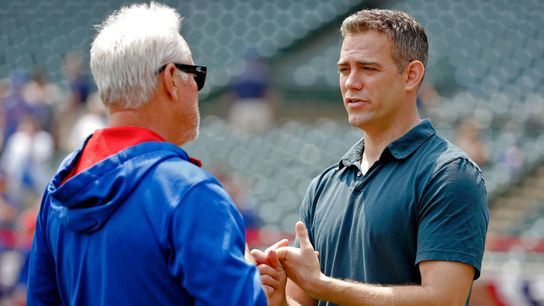Theo Epstein will one day have his own wing of the Baseball Hall of Fame, if the entire structure isn't named after him. The man who did the impossible in both Boston and Chicago -- if that sounds self-evident now, transport yourself back to 2003, or 1982, or 1954, or 1923 -- is a living legend in team-building.
That legend gave a commencement address at Yale earlier this month and shared the lessons he learned in the Cubs' World Series Game 7 win over the Cleveland Indians.
For those who don't remember:
https://www.youtube.com/watch?v=fdtu2pAn-HM
We'll pick up Epstein's speech as he describes descending into the bowels of Progressive Field to get an update on the rain delay that supernaturally paused the most dramatic baseball game of this century in between the ninth and tenth innings.
Still in a bit of a daze, I cut through our clubhouse toward a meeting about the weather. Turning a corner, I saw, through the window of the weight room door, the backs of our players' blue jerseys, shoulder to shoulder and packed tightly, all 25 guys squeezed into a space designed for half that many. It was an unusual sight. We hardly ever had meetings and never during a game. I inched closer to the door and saw Aroldis Chapman, the pitcher who had surrendered the tying home run, in tears. I lingered just long enough to hear a few sentences.
“We would not even be here without you,” catcher David Ross said as he embraced Chapman. “We are going to win this for you. We are going to win this for each other.”
Outfielder Jason Heyward walked to the middle of the room: “We are the best team in baseball” he said. “We’ve leaned on each other all year. We’ve still got this. This is only going to make it sweeter.”
And then first baseman Anthony Rizzo: “Nobody can take this away from us. We have each other.”
Kyle Schwarber stood up with a bat in his hands: "We win this right here!"
I turned away, a big smile on my face, and headed to the weather meeting.
Epstein explained why it mattered that those players specifically were the ones speaking.
I learned later that the players’ only meeting had been called by Heyward, a 27-year-old who was suffering through a terrible offensive season, by far the worst of his career. Most players who are having seasons that rough detach from the team and isolate themselves — either to the disabled list or to the periphery of the clubhouse. But Heyward stayed at the center of everything: he never stopped being invested in his teammates, opened up to them about his own struggles, and bought them suites on the road for gatherings. The first to speak was Ross, the 38-year-old backup catcher in his final season who made a career out of being a wonderful teammate (and who is now in the finals of Dancing With The Stars. And you thought you were having a good year?) Rossy was always reaching out to befriend the loneliest players, organizing team dinners, breaking down the barriers that sometimes arise between players of different backgrounds in the clubhouse. The last to speak was Rizzo, the young team leader who all season long was reminding his teammates they were going to make history together, have a parade, and spend the rest of eternity linked with one another. Anthony, a survivor of pediatric cancer, just celebrated the World Series by making a $3.5 million gift to Chicago's Lurie Children’s Hospital. Schwarber, who raced out of the meeting and right into the batter’s box, had torn two ligaments in his knee in the third game of the season – a 12-to-15 month injury. Rather than disappearing to a rehab facility, Schwarber, just 23, stayed connected with his team, getting his rehab work done early so nobody would have tosee him in that state, and then functioning as an extra coach for his teammates the rest of the day. He kept telling his teammates he was going to find a way to help them win. Shocking the doctors and everyone else, Schwarber returned in just six months, right in time for the World Series. He hit over .400, including the single to start the deciding rally in Game Seven.
He then explained why it was so important that the Cubs pulled together in the defining moment of their professional lives.
During rain delays players typically come in off the field and head to their own lockers, sit there by themselves, change their wet jerseys, check their phones, think about what has gone right and wrong during the game, and become engrossed in their own worlds. That would have been disastrous for our team during Game Seven — 25 players sitting alone at their lockers, lamenting the bad breaks, assigning blame, wallowing, wondering. Instead, they had the instinct to come together.
Actually, it was not an instinct; it was a choice.
The lesson Epstein took from that, what he'll tell his young sons someday and what he told Yale graduates last week, is that keeping your head up in life, being part of a team and pulling together when times get stuff will get you much further in life than the alternative.
